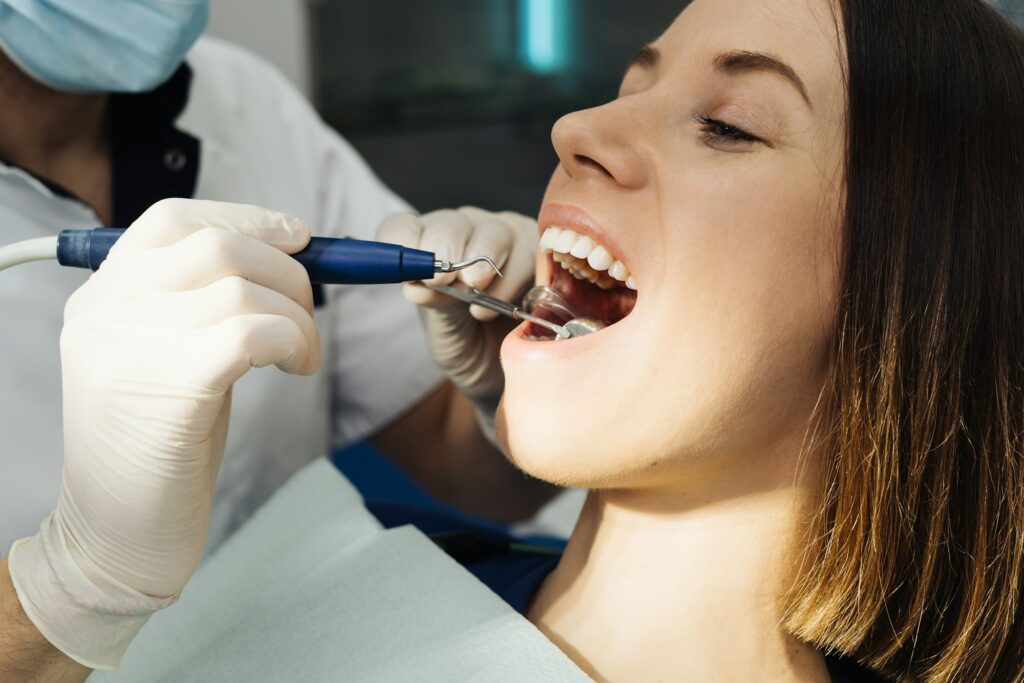Am I at a high risk for cavities?
Your Diet and Brushing Habits Can Increase Your Risk For Cavities
Everyone is at risk for developing cavities. However, there are certain factors that can increase the chance of tooth decay, including:
-
- Frequent snacking throughout the day
-
- Heartburn or gastroesophageal reflux disease (GERD)
Cavities are also common in young children and teenagers because their teeth are still developing. Older adults are also at a higher risk, as normal wear and tear makes teeth more vulnerable to decay.
So what actually causes cavities?
Plaque Forms
There are millions of bacteria in your mouth which thrive on sugary foods and drinks. When teeth are left unbrushed, bacteria can feed on leftover sugar, producing acid. The acid and bacteria then combine to form plaque.
Acid Erodes the Enamel
Plaque sticks to teeth and the acids within begin to wear away at the outer surface of teeth, called enamel. Over time, small openings begin to appear in the enamel, and these openings are the first stage of a cavity.
Decay Spreads
The longer plaque and bacteria are left on teeth, the larger the cavity can become. Decay can reach the deeper layers of the tooth, causing irritation, sensitivity, and pain. Extensive decay can eventually cause tooth loss.
How can I avoid getting a cavity?
“Even though they’re preventable, cavities are the most common chronic disease in children and adolescents. If you’re an adult, it doesn’t mean you’re out of the woods. 9 out of 10 adults over the age of 20 have had one or more cavities, according to the CDC.”
Mark Burhenne, DDS
Properly Caring for Your Teeth Can Prevent Cavities
Good Oral Hygiene
Brushing and flossing your teeth regularly is a great way to prevent cavities, especially if you use fluoride toothpaste. Routine visits to the dentist for cleanings and exams can also help prevent tooth decay.
Healthy Foods
Some foods and beverages are healthier for your teeth than others. Avoid sugary foods high in carbohydrates and focus on fresh, whole fruits and vegetables.
Preventive Dental Treatments
Your dentist can provide fluoride treatments or dental sealants to protect your teeth against decay. Fluoride can help strengthen your enamel, while sealants cover chewing surfaces to reduce the risk of cavities.
So how do I know if I have a cavity?
Regular Dental Exams Can Reveal Small Cavities
Your dentist can usually detect areas of decay during a routine exam. They will examine your teeth and probe the surfaces with a dental instrument to look for soft spots. An x-ray can reveal cavities below the surface.
Attending regular, biannual dental exams can help your dentist identify signs of tooth decay early. Small cavities are easier to treat. When you leave a cavity untreated, it can continue to grow and cause more extensive damage to your smile.
So I have a cavity. Now what?
The Size of Your Cavity Will Determine Treatment
Fluoride Treatments
In the early stages of a cavity, your dentist may be able to repair damaged tooth enamel and reverse the effects of erosion. Professional-strength fluoride treatments contain higher concentrations of fluoride and can encourage your tooth to remineralize.
Dental Fillings
The most common treatment for a dental cavity is a filling. Your dentist will remove the damaged tissue and renew the strength of your tooth with a dental filling, made from composite resin, porcelain, or amalgam.
Dental Crowns
In some cases, your dentist may need to place a dental crown to restore a tooth affected by a large cavity. During this treatment, they will remove decayed tissue and shape your tooth to accommodate the crown.
Root Canal Therapy
If decay has spread to the internal layers of your tooth, your dentist may need to perform root canal therapy to remove infected tissue and protect your tooth from otherwise necessary extraction.
Are there other ways to protect my smile?
Schedule An Appointment With Your Dentist
While brushing and flossing at home can reduce your risk for cavities, visiting the dentist regularly is the best way to protect your smile. Schedule an appointment with your dentist for an exam and professional cleaning to keep your smile healthy.

